Fleurs du Mal Magazine


Or see the index

Ton van Reen
spitsuur
Een sirene jankt
en de dag
spat open
fabrieken lopen leeg
schoorstenen wuiven
de arbeiders na
auto’s spelen van
wie komt er in mijn hokje
langzaam lopend
in een rijtje
behangen ze de lucht
met hun ratelend hart
op hoge benen
lopen meisjes voorbij
ongemerkt halen ze
tussen zwoele wanden van ogen
de avond binnen
Uit: Ton van Reen, Blijvend vers, Verzamelde gedichten (1965-2007). Uitgeverij De Contrabas, 2011, ISBN 9789079432462, 144 pagina’s, paperback
kempis.nl poetry magazine
More in: Archive Q-R, Reen, Ton van
![]()
31 januari 2012
Schrijfster Doeschka Meijsing overleden
In haar woonplaats Amsterdam is gisteravond de schrijfster Doeschka Meijsing overleden. Zij werd vierenzestig jaar. Meijsing stierf aan de complicaties van een zware operatie.
Doeschka Meijsing schreef vele verhalen, gedichten, essays en romans. Ze debuteerde in 1974 bij Querido met De hanen en andere verhalen. Voor Tijger, tijger! (1980) ontving ze de Multatuliprijs. De tweede man (2000) werd genomineerd voor de AKO Literatuurprijs en betekende Meijsings doorbraak naar het grote publiek. Haar roman 100% chemie (2002) werd genomineerd voor de Libris Literatuur Prijs en kan worden gezien als een opmaat tot Moord, haar deel van de roman Moord & Doodslag (2005), die ze samen met haar broer Geerten Meijsing schreef. In 2008 publiceerde ze de roman Over de liefde, die bekroond werd met de F. Bordewijkprijs, de Opzij Literatuurprijs en de AKO Literatuurprijs. Dit aangrijpende relaas over de schaamte die liefde heet, werd haar laatste boek.
Annette Portegies, directeur/uitgever Querido: ‘Doeschka Meijsing verborg een diepe kwetsbaarheid achter een superieure vorm van ironie, zowel in haar werk als in haar leven. Weerspannig als ze was, was ze een vrouw om van te houden. Querido rouwt om de dood van Doeschka, die bijna veertig jaar aan de uitgeverij verbonden was. De Nederlandse literatuur verliest opnieuw een auteur van wereldformaat.’
De begrafenis zal in besloten kring plaatsvinden.
Daarachter
De diepte ja,
die kennen we.
Die is vaak nogal hartgrondig.
Maar de geur van violieren.
De deur naar de andere
kamer.
Waar ieder
voorwerp specifiek de geliefde
spiegelt.
Waar ieder
ander een rivaal is.
Die deur.
Daarachter.
Wie er liederen zingt.
Die.
(uit: ‘Paard Heer Mantel’, 1986)
Doeschka Meijsing (1947-2012) schreef verhalen, gedichten, essays en romans. Ze debuteerde in 1974 met De hanen en andere verhalen. Voor Tijger, tijger! (1980) ontving ze de Multatuliprijs. De tweede man (2000) werd genomineerd voor de AKO Literatuurprijs en betekende Meijsings doorbraak naar het grote publiek. Haar roman 100% chemie (2002) werd genomineerd voor de Libris Literatuur Prijs en kan worden gezien als een opmaat naar Moord, haar deel van de spraakmakende roman Moord & Doodslag (2005), die ze samen met haar broer Geerten schreef. In 2007 publiceerde ze de kleine roman De eerste jaren en in 2008 volgde haar veelgeprezen bestseller Over de liefde die bekroond werd met de die bekroond werd met de F. Bordewijkprijs, de Opzij Literatuurprijs en de AKO Literatuurprijs. Doeschka Meijsing heeft een indrukwekkend oeuvre op haar naam staan, dat in 1997 werd bekroond met de Annie Romeinprijs.
romans en verhalen:
De hanen en andere verhalen (1974)
Robinson (1976)
De kat achterna (1977)
Tijger, tijger! (1980)
Utopia of De geschiedenissen van Thomas (1982)
Beer en Jager (1987)
De beproeving (1990)
Vuur en zijde (1992)
Beste vriend (1994)
De weg naar Caviano (1996)
De tweede man (2000)
100 % chemie (2002)
Moord & Doodslag (2005) met Geerten Meijsing
De eerste jaren (2007)
Over de liefde (2008)
fleursdumal.nl magazine
More in: Archive M-N, In Memoriam
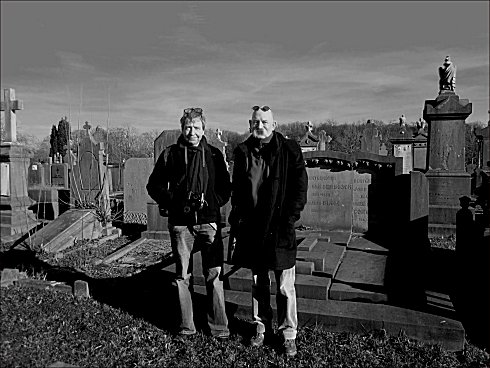
joep eijkens (links) en bert bevers
Kreunende tijd
nieuwe gedichtencyclus Bert Bevers
met foto’s van Joep Eijkens
IV
Toen je hier ter aarde werd besteld met die
gedoofde blik naar de ontelbare sterren van het
noorden gericht sneeuwde het. Toen wel. Om te
sterven volstond het om met ademen te stoppen.
Dat wel. Maar dat allengs muller zwijgen van alle
geliefden valt heel wat zwaarder. O hemel toch,
een heel leven lang vergat je dit te schrijven.
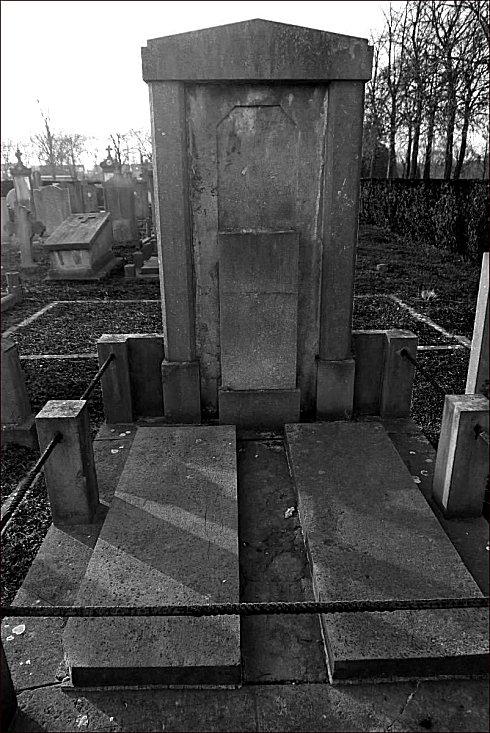
VIII
Verloochen verleden nooit. Het is er voor altijd. Het gaat
gewoon niet weg. Het zingt lang na. Zinder maar. Doe maar.
Keer maar rustig eeuwig weer, aarzelende treurengel en
maak alles maar mooier dan het is. Ik zie mensen rondlopen
met een donker gemoed, met de koele zekerheid van een profeet.
Of ze aan galgen zijn gehangen slaan achter hen schaduwen
neder. In de verte blaft een hond een brandweerwagen na.

fleursdumal.nl magazine
More in: Bevers, Bert, Joep Eijkens Photos
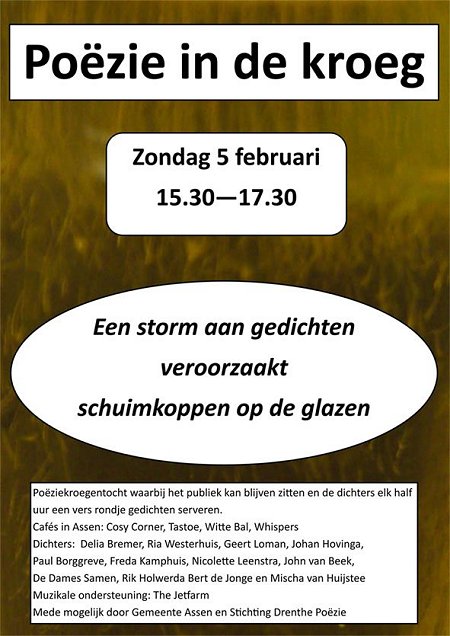
Poëzie in de kroeg in Assen
op zondag 5 februari
Zondag 5 februari 2012 is het weer zo ver. Van 15.30 tot 17.30 uur zijn de inwoners van heel Drenthe en omstreken van harte welkom om aan te schuiven in een van de gelegenheden om te genieten van een drankje maar vooral van een verse portie gedichten.
Gezien de vele positieve reacties van het afgelopen jaar, kon een tweede editie van Poëzie in de Kroeg niet uitblijven. In samenwerking met de gemeente Assen hebben stadsdichter Mischa van Huijstee en Geert Loman weer een aantal dichters weten te strikken om er voor de bezoekers een aangename middag van te maken. De poëten zullen in groepjes langs een aantal kroegen in de binnenstad trekken. Als u blijft zitten in één van de kroegen hoort u ze allemaal voorbij komen.
Dichters die hebben toegezegd een bijdrage te leveren zijn: Geert Loman, Delia Bremer, Ria Westerhuis, John van Beek, Nicolette Leenstra, Bert de Jonge, De Dames Samen, Rik Holwerda, Paul Borggreve, Freda Kamphuis en Johan Hovinga.
U kunt hun poëzie beluisteren in de café’s Tastoe, Whispers, Cosy Corner en de Witte Bal.
De organisatie is erg blij dat de Witte Bal ook zijn deuren opent, aangezien de eigenaar Tieme van Veen nog maar net overleden is. Hij was er als een van de eersten bij om zijn medewerking toe te zeggen aan dit evenement.
De toegang is gratis. Na afloop komen de dichters nog even bij elkaar in café Whispers. Dan is er alle gelegenheid om nog even na te praten en/of een drankje te drinken.
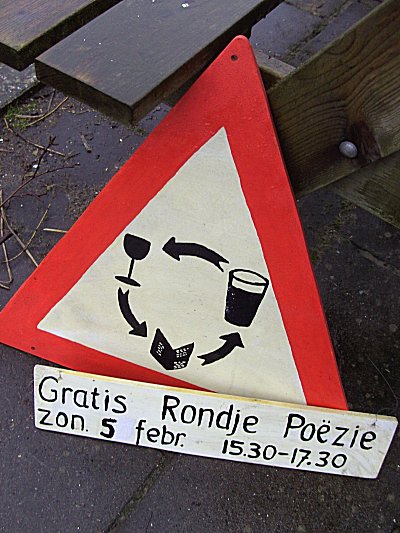
fleursdumal.nl magazine
More in: City Poets / Stadsdichters, Kamphuis, Freda

Over het doorstaan van de rijpheid
kan ik allerhande vruchten uit vreemde landen
ongeschonden in een mand op je hoofd laden
erop toezien dat ze geen connotaties aangaan
met een tot woordeloos geslagen lichaamsdeel
tegenwerpen dat op je buik opgediend worden
ze uit de bluts houdt, ze op het stilleven drukt
ze in voorhoedegevechten brengt tegen de tong
die van elke schaal de vlezigste bodem afzoekt
in de wetenschap dat een eetbare banaan zaadjes
ontbeert, van haar kweker het snoeimes trotseert
of zal ik met Burlatkersen je paternosteren
Richard Steegmans
(Uit: Richard Steegmans: Ringelorend zelfportret op haar leeuwenhuid, uitgeverij Holland, Haarlem, 2005)
Richard Steegmans gedichten
kempis.nl poetry magazine
More in: Archive S-T, Steegmans, Richard
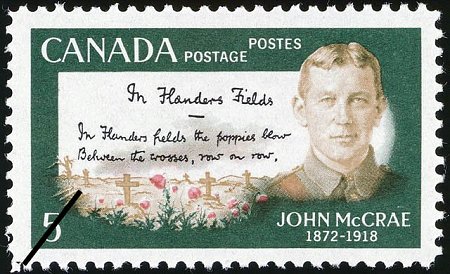
John McCrae
(1872 – 1918)
Then And Now
Beneath her window in the fragrant night
I half forget how truant years have flown
Since I looked up to see her chamber-light,
Or catch, perchance, her slender shadow thrown
Upon the casement; but the nodding leaves
Sweep lazily across the unlit pane,
And to and fro beneath the shadowy eaves,
Like restless birds, the breath of coming rain
Creeps, lilac-laden, up the village street
When all is still, as if the very trees
Were listening for the coming of her feet
That come no more; yet, lest I weep, the breeze
Sings some forgotten song of those old years
Until my heart grows far too glad for tears.
John McCrae poetry
kempis.nl poetry magazine
More in: Archive C-D, McCrae, John
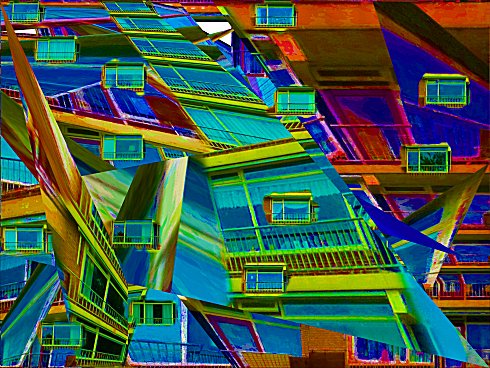
Freda Kamphuis
Flatscape (2011)
kempis.nl poetry magazine
More in: Freda Kamphuis, Kamphuis, Freda

William Shakespeare
(1564-1616)
THE SONNETS
113
Since I left you, mine eye is in my mind,
And that which governs me to go about,
Doth part his function, and is partly blind,
Seems seeing, but effectually is out:
For it no form delivers to the heart
Of bird, of flower, or shape which it doth latch,
Of his quick objects hath the mind no part,
Nor his own vision holds what it doth catch:
For if it see the rud’st or gentlest sight,
The most sweet favour or deformed’st creature,
The mountain, or the sea, the day, or night:
The crow, or dove, it shapes them to your feature.
Incapable of more, replete with you,
My most true mind thus maketh mine untrue.
![]()
kempis.nl poetry magazine
More in: -Shakespeare Sonnets

Blues met bekentenis
Eens beroept de geliefde zich op een ommekeer van gevoelens,
loopt ze op een onzichtbare morgen voorgoed zonder koffers zijn idioom uit.
Hij neemt voor kort de kleur aan
van een overgewaaid bevattelijk lied,
zeult het knaagdier als in de voering
van winterjassen mee in bluesmuziek.
Verlamde neger, doordrenkte schoenenen een grof pak, vlooit zijn stem na
in ritmes waarop zijn mannelijkheid is
vertrapt. Een man van herhaalde malen.
Blues is uitgelicht een botsing
van klank op dichtgeslagen deuren.
Blues is achteropgeraakte
liefde, een uitgeleefde die overgaat in schoongewreven instrumenten, waarmee
voor nieuwe liefde weer geen mond kan gesnoerd.
Straten, met de lome lengte nu van veel nog te vergeten dagen,
waren hun zij aan zij zo gewend van
blues is geen onderdak bekend.
Richard Steegmans
(Uit: Richard Steegmans: Ringelorend zelfportret op haar leeuwenhuid, uitgeverij Holland, Haarlem, 2005)
Richard Steegmans gedichten
kempis.nl poetry magazine
More in: Archive S-T, Steegmans, Richard

Ivo van Leeuwen, 2011
Portret van Esther Porcelijn, actrice en stadsdichter van Tilburg
©ivovanleeuwen

kempis.nl poetry magazine
More in: Ivo van Leeuwen, Porcelijn, Esther, Porcelijn, Esther
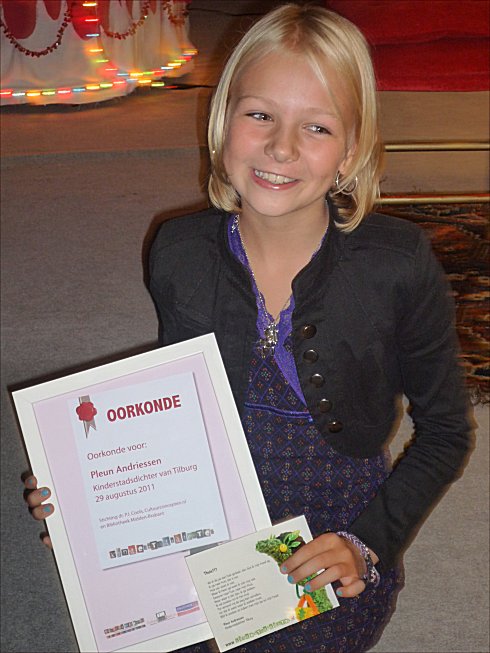
Weggeblazen
Opgesloten in je ogen
Helemaal alleen
Weggeblazen, opgetild
Bliksemschicht door mij heen
Pleun Andriessen
Pleun Andriessen (11) is de nieuwe Kinderstadsdichter van Tilburg. Pleun schreef speciaal voor Gedichtendag, 26 januari 2012, een nieuw gedicht. Het past mooi binnen het thema van deze dag, ‘Stroom’: ‘Stroom is ritme, flow, een vloeiende en ongrijpbare beweging van A naar B, dankzij een teveel aan de ene of een tekort aan de andere kant. Stromen kunnen uit woorden bestaan, uit lading, gedachten, uit informatie, stoffen of dingen. Stromen verbinden plekken op deze wereld en brengen mensen bij elkaar. Of juist niet. ‘Stroom’ is er altijd en overal.’
Meer informatie:
≡Website Kinderstadsdichter Tilburg

kempis.nl poetry magazine
More in: Andriessen, Pleun, Archive A-B
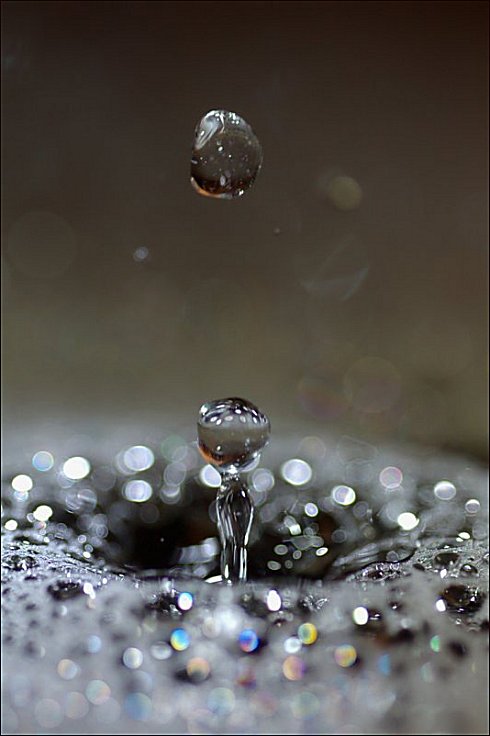
Heinrich Heine
(1797-1856)
Seekrankheit
Die grauen Nachmittagswolken
Senken sich tiefer hinab auf das Meer,
Das ihnen dunkel entgegensteigt,
Und zwischendurch jagt das Schiff.
Seekrank sitz ich noch immer am Mastbaum,
Und mache Betrachtungen über mich selber,
Uralte, aschgraue Betrachtungen,
Die schon der Vater Loth gemacht,
Als er des Guten zuviel genossen
Und sich nachher so übel befand.
Mitunter denk ich auch alter Geschichtchen:
Wie kreuzbezeichnete Pilger der Vorzeit,
Auf stürmischer Meerfahrt, das trostreiche Bildnis
Der heiligen Jungfrau gläubig küßten;
Wie kranke Ritter, in solcher Seenot,
Den lieben Handschuh ihrer Dame
An die Lippen preßten, gleich getröstet –
Ich aber sitze und kaue verdrießlich
Einen alten Hering, den salzigen Tröster
In Katzenjammer und Hundetrübsal!
Vergebens späht mein Auge und sucht
Die deutsche Küste. Doch ach! nur Wasser,
Und abermals Wasser, bewegtes Wasser!
Wie der Winterwandrer des Abends sich sehnt
Nach einer warmen, innigen Tasse Tee,
So sehnt sich jetzt mein Herz nach dir,
Mein deutsches Vaterland!
Mag immerhin dein süßer Boden bedeckt sein
Mit Wahnsinn, Husaren, schlechten Versen
Und laulich dünnen Traktätchen;
Mögen immerhin deine Zebras
Mit Rosen sich mästen statt Disteln;
Mögen immerhin deine noblen Affen
In müßigem Putz sich vornehm spreizen
Und sich besser dünken als all das andre
Banausisch dahinwandelnde Hornvieh;
Mag immerhin deine Schneckenversammlung
Sich für unsterblich halten,
Weil sie so langsam dahinkriecht,
Und mag sie täglich Stimmen sammeln,
Ob den Maden des Käses der Käse gehört?
Und noch lange Zeit in Beratung ziehen,
Wie man die ägyptischen Schafe veredle,
Damit ihre Wolle sich beßre
Und der Hirt sie scheren könne wie andre,
Ohn Unterschied –
Immerhin, mag Torheit und Unrecht
Dich ganz bedecken, o Deutschland!
Ich sehne mich dennoch nach dir:
Denn wenigstens bist du noch festes Land.
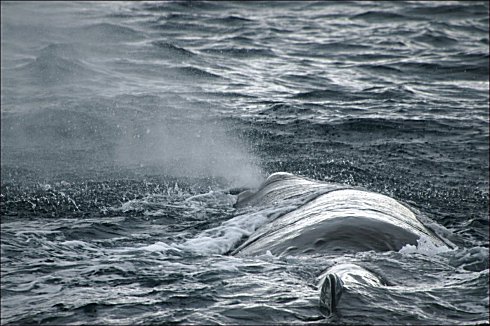
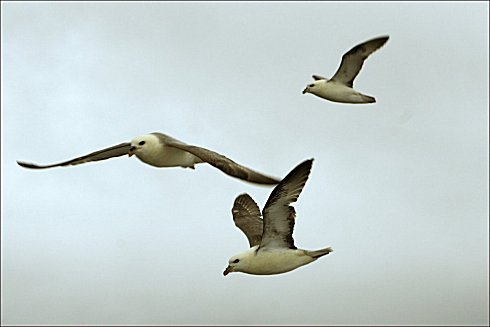
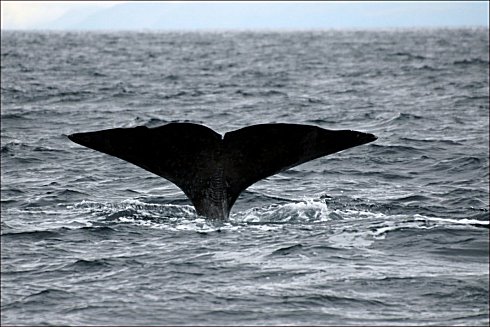

Hans Hermans photos – Natuurdagboek 11-11
Gedicht Heinrich Heine
kempis.nl poetry magazine
More in: Archive G-H, Hans Hermans Photos, Heine, Heinrich
Thank you for reading Fleurs du Mal - magazine for art & literature